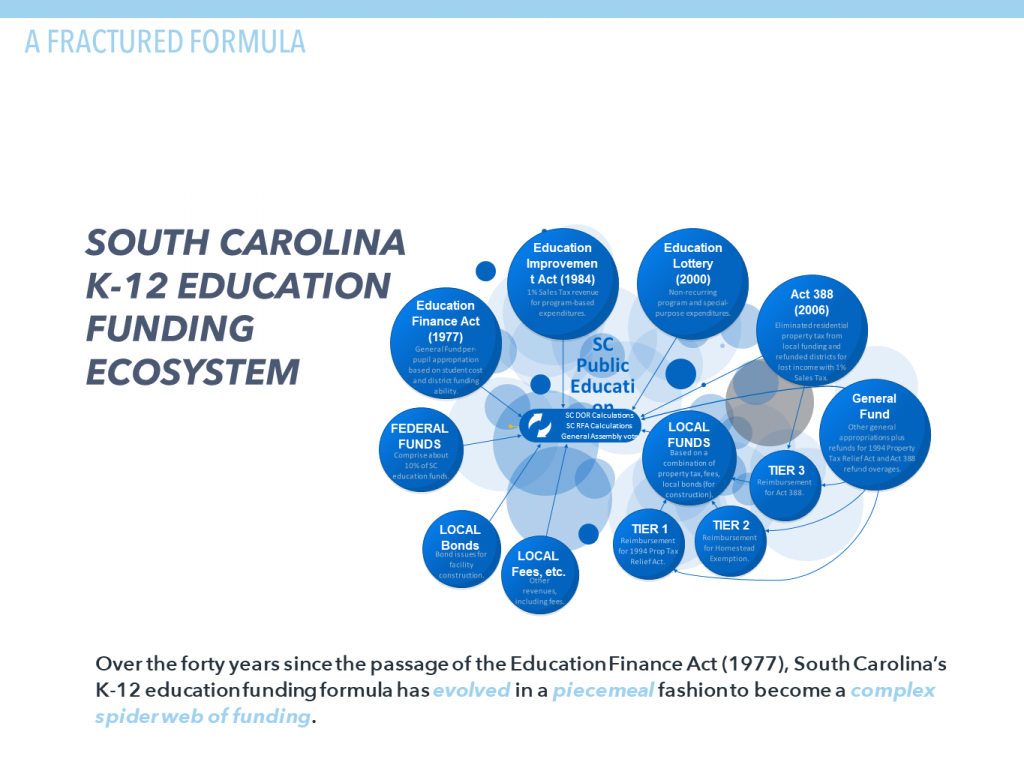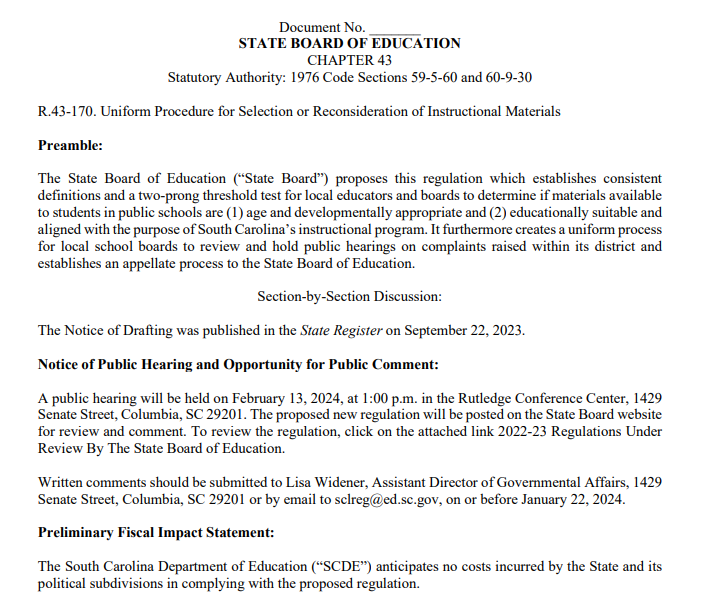Why Finance Reform is a Must for SC Education

Ellen Weaver
Ellen Weaver, President of Palmetto Promise Institute, recently testified before the South Carolina House Education Reform Committee on the critical need to reform South Carolina’s broken education funding system. Her remarks previewed groundbreaking research commissioned by Palmetto Promise and performed by Dr. Rebecca Gunnlauggson, South Carolina’s premier independent economist.
It’s an honor to be invited to speak with you today about one of the most pressing issues South Carolina faces: our broken system of education and the difficult decisions and courageous leadership it is going to take to fundamentally fix it.
Palmetto Promise Institute is a non-profit research organization created by South Carolinians, for South Carolinians. Our daily work aims to do the research and create the data-based resources that can take on the many challenges and opportunities our state faces and help our citizens reach their full potential.
Since our founding in 2013, we have been passionate advocates for proven, student-centered education policies that can unlock the door of opportunity for every child in our state to reach their full potential. But in the course of our work, we keep returning to the idea that finance reform is foundational to any sustainable, meaningful policy reform.
So I commend the Chairman for his vision in establishing this Committee and for his determination that this work must be done. Systemic reform starts with overhauling our broken system of education finance.
Practically speaking, this is a JOBS issue.
A litany of statistics that I won’t rehearse today – and any conversation you have with employers around this state – tell the sad story. As you are well aware, we spend more on K-12 education than any other line item in our state’s budget. And yet that spending is not preparing a majority of our students to be ready with the skills they need for the jobs of the future.
But just as important, this is a JUSTICE issue.
We are all aware of the deep historic – and current – inequities in our state that fall along geographic, racial and income lines. Addressing these issues gives a strong moral imperative to an otherwise dollars and cents discussion.
Lastly, this is what I like to call a JUST FACE THE FACTS issue.
South Carolina has a growing – and aging population. This, combined with a laundry list of fiscal dilemmas – like an unfair and uncompetitive tax code, an underfunded pension system, growing infrastructure needs, and rising health care costs – have combined to create the perfect fiscal storm, which we have dubbed “Hurricane Gray.”
According to US Census data, currently, 59 out of every 100 adults in South Carolina are either under the age of 18 – and consuming education benefits – or over the age of 65 and consuming health care benefits. This leaves 41 people “pulling the cart” – or in other words, paying the vast majority of the state’s bills.

By 2030, the Census bureau estimates that that number will be 79 out of every 100 – or 21 out of every 100 funding state priorities…like education.
This means we have NO CHOICE but to better align CURRENT SPENDING to produce the outcomes that we so desperately need, most notably, in education.
Which brings us back to why we’re here today: the urgent imperative to fundamentally examine our system of education finance and align inputs – dollars spent – with outcomes – student success.
Which is why I’m pleased to introduce Dr. Rebecca Gunnlaugsson, South Carolina’s premier independent economist. Dr. Gunnlaugsson has deep experience in both the public and private sectors, having served as the Chief Economist for the South Carolina Department of Commerce and as a Senior Technology Consultant for Accenture. She is also a well-credentialed academic with degrees from MIT and Michigan…but just as importantly, she is a real-world problem-solver.
While at the South Carolina Department of Commerce, Dr. Gunnlaugsson led the research effort to analyze South Carolina Unemployment Insurance (UI) data to develop a more efficient model of system financing to provide future adequate funding for the UI Trust Fund which, like so many other state trust funds, had become indebted due to the Great Recession. As a result of her work, legislation was passed that reorganized the South Carolina Department of Employment and Workforce and implemented a new UI system. Today, the UI Trust Fund is fully funded.
This is the expertise that Rebecca brings to the work that she will present to you today. I won’t steal her thunder…but suffice it to say that I believe her data-driven findings underline the need for a BOLD, FUNDAMENTAL RESTRUCTURING of education finance in our state.
Restructuring that pushes vital – but finite – resources out of programs and bureaucracies back into classrooms. And frees principals and teachers to be empowered innovators.
Restructuring that moves beyond funding the system of the past to imagine and unleash the system of the future: a system that opens up the opportunity for every student in our state to reach their full, God-given potential regardless of their race, income or zip code.
WATCH Dr. Gunnlauggson’s Remarks to the House Committee (11/14/17)
VIEW Dr. Gunnlauggson’s Full Slide Presentation




